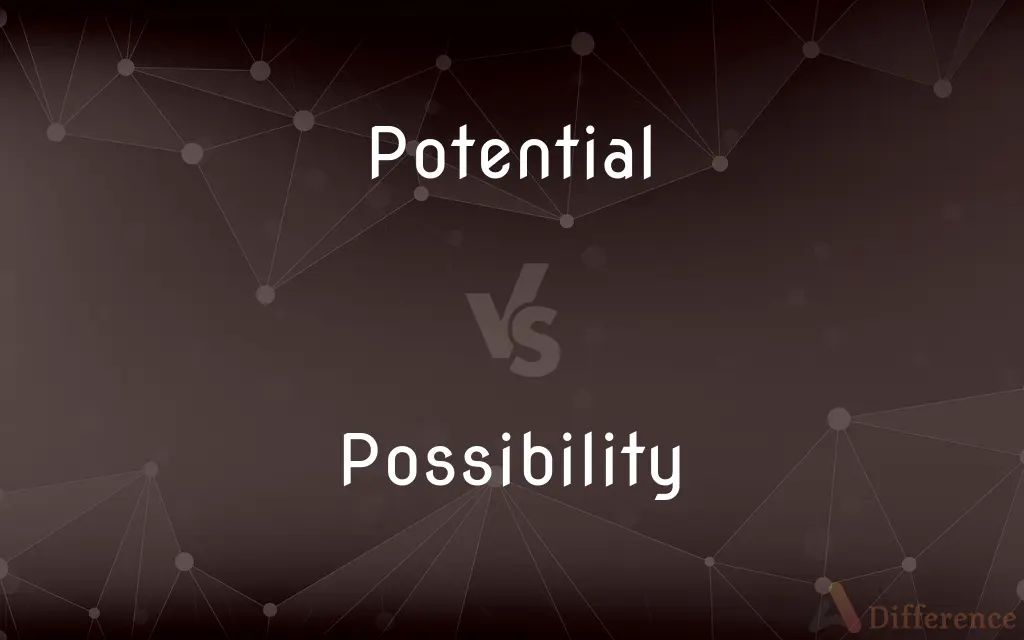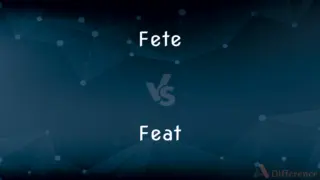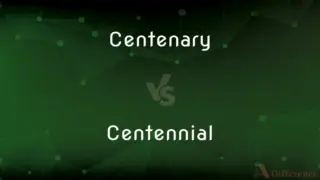Potential vs. Possibility — What's the Difference?
By Tayyaba Rehman & Maham Liaqat — Updated on March 25, 2024
Potential refers to the capability of becoming something or achieving results, focusing on future growth or development, while possibility denotes the chance that something might occur or exist.

Difference Between Potential and Possibility
Table of Contents
ADVERTISEMENT
Key Differences
Potential is inherently linked to the abilities or qualities within a person, thing, or situation that allow for the achievement or realization of something greater in the future. It emphasizes latent qualities that, when nurtured, lead to significant growth or improvement. Whereas, possibility is more about the existence of conditions or circumstances that could lead to various outcomes, without necessarily relating to inherent qualities or capabilities.
Potential often carries a more positive connotation, suggesting an optimistic forecast for growth or achievement based on existing qualities. It's about realizing the inherent abilities or strengths that exist within. On the other hand, possibility can be neutral, simply indicating that something could happen, without the implication of improvement or growth.
When discussing potential, there's usually an implication of development and effort required to reach a particular goal or state. It suggests that if certain actions are taken, the inherent qualities can be developed to achieve something. Whereas possibility does not inherently imply effort or development; it's more about the chance of something happening regardless of action.
Potential is often discussed in the context of future achievements, talents, or capabilities that are yet to be fully realized. It focuses on what could be achieved under the right conditions. In contrast, possibility can refer to any future event or condition, whether it's related to achievement, occurrence, or existence.
Potential is closely tied to specific contexts or fields, such as individual talents, technological advancements, or business growth, where there's a clear pathway to unlocking or achieving more. Possibility, however, spans a wider range of scenarios, including events and situations that might not be directly linked to the inherent qualities or capabilities of the entities involved.
ADVERTISEMENT
Comparison Chart
Definition
Inherent ability or capacity for growth or achievement.
Chance or condition that something might happen or exist.
Connotation
Generally positive, implies future growth or success.
Neutral, indicates uncertainty without inherent value judgment.
Relation to Effort
Implies effort or development is needed to realize.
Does not inherently imply effort; relates more to chance.
Context
Often linked to abilities, improvement, or capabilities.
Broader, can apply to any uncertain future event or existence.
Future Orientation
Focused on what could be achieved with development.
Concerns the mere existence or occurrence of something in the future.
Compare with Definitions
Potential
Inherent ability awaiting development.
The startup shows great potential for the tech industry.
Possibility
A condition that might occur.
The possibility of a strike could disrupt plans.
Potential
Capability of becoming more.
The athlete has the potential to break world records.
Possibility
Potential occurrence.
The possibility of an error should not be ignored.
Potential
Latent qualities for growth.
She has the potential to become a great leader.
Possibility
Future event uncertainty.
Exploring the possibility of life on other planets fascinates scientists.
Potential
Capacity for advancement.
This idea has the potential to change our approach to energy consumption.
Possibility
Scope for something to happen.
There's a possibility that the meeting will be postponed.
Potential
Future achievement possibility.
There's potential for significant profit in this investment.
Possibility
Chance of something happening.
There's a possibility of rain tomorrow.
Potential
Potential generally refers to a currently unrealized ability. The term is used in a wide variety of fields, from physics to the social sciences to indicate things that are in a state where they are able to change in ways ranging from the simple release of energy by objects to the realization of abilities in people.
Possibility
A thing that may happen or be the case
There was the possibility that he might be turned down
Relegation remains a distinct possibility
Potential
Capable of being but not yet in existence; latent or undeveloped
A potential problem.
A substance with many potential uses.
Possibility
The fact or state of being possible
Investigating the possibility of life on other planets.
Potential
(Grammar) Of, relating to, or being a verbal construction with auxiliaries such as may or can; for example, it may snow.
Possibility
Something that is possible
His promotion now seems a possibility.
Potential
The inherent ability or capacity for growth, development, or future success
An investment with a lot of potential.
A singer who has the potential to become a major star.
Possibility
One that is capable of being chosen or of being made real
She is a strong possibility in the senatorial race. There are several possibilities for dessert.
Potential
The possibility that something might happen or result from given conditions
A tense situation with the potential to turn into a riot.
Farming practices that increase the potential for the erosion of topsoil.
Possibility
Possibilities Potentiality for favorable or interesting results
The idea has great possibilities.
Potential
See electric potential.
Possibility
The quality of being possible.
Potential
See gravitational potential.
Possibility
A thing possible; that which may take place or come into being.
Potential
See magnetic potential.
Possibility
An option or choice, usually used in context with future events.
Potential
(Grammar) A potential verb form.
Possibility
(obsolete) Capability, power or capacity to act.
Potential
Currently unrealized ability (with the most common adposition being to)
Even from a young age it was clear that she had the potential to become a great musician.
Possibility
The quality or state of being possible; the power of happening, being, or existing.
Potential
(physics) The gravitational potential: the radial (irrotational, static) component of a gravitational field, also known as the Newtonian potential or the gravitoelectric field.
Possibility
That which is possible; a contingency; a thing or event that may not happen; a contingent interest, as in real or personal estate.
Potential
(physics) The work (energy) required to move a reference particle from a reference location to a specified location in the presence of a force field, for example to bring a unit positive electric charge from an infinite distance to a specified point against an electric field.
Possibility
A future prospect or potential;
This room has great possibilities
Potential
(grammar) A verbal construction or form stating something is possible or probable.
Possibility
Capability of existing or happening or being true;
There is a possibility that his sense of smell has been impaired
Potential
Existing in possibility, not in actuality.
Possibility
A tentative theory about the natural world; a concept that is not yet verified but that if true would explain certain facts or phenomena;
A scientific hypothesis that survives experimental testing becomes a scientific theory
He proposed a fresh theory of alkalis that later was accepted in chemical practices
Potential
(archaic) Being potent; endowed with energy adequate to a result
Possibility
A possible alternative;
Bankruptcy is always a possibility
Potential
(physics) A potential field is an irrotational (static) field.
Potential
(physics) A potential flow is an irrotational flow.
Potential
(grammar) Referring to a verbal construction of form stating something is possible or probable.
Potential
Being potent; endowed with energy adequate to a result; efficacious; influential.
Potential
Existing in possibility, not in actuality.
Potential existence means merely that the thing may be at ome time; actual existence, that it now is.
Potential
Anything that may be possible; a possibility; potentially.
Potential
In the theory of gravitation, or of other forces acting in space, a function of the rectangular coordinates which determine the position of a point, such that its differential coefficients with respect to the coördinates are equal to the components of the force at the point considered; - also called potential function, or force function. It is called also Newtonian potential when the force is directed to a fixed center and is inversely as the square of the distance from the center.
Potential
The energy of an electrical charge measured by its power to do work; hence, the degree of electrification as referred to some standard, as that of the earth; electro-motive force.
Potential
The inherent capacity for coming into being
Potential
The difference in electrical charge between two points in a circuit expressed in volts
Potential
Existing in possibility;
A potential problem
Possible uses of nuclear power
Potential
Expected to become or be; in prospect;
Potential clients
Expected income
Common Curiosities
Is potential always related to positive outcomes?
While potential often implies positive outcomes, it fundamentally relates to the capacity for any significant change or achievement, not exclusively positive.
Can something have potential without any possibility?
No, for potential to be realized, there must be at least some possibility, though it might vary in probability.
Can potential and possibility overlap?
Yes, they can overlap when discussing the chances of realizing one's potential, where the potential is the capacity for achievement and the possibility is the chance of that achievement happening.
How does effort relate to potential and possibility?
Realizing potential usually requires effort and development, while possibility does not inherently depend on effort.
How do potential and possibility differ in connotation?
Potential usually has a positive connotation, focusing on improvement or growth, while possibility is neutral, indicating uncertainty.
Are potential and possibility mutually exclusive concepts?
No, they are distinct but can intersect; potential focuses on inherent capabilities, whereas possibility refers to the chance of various outcomes.
What influences the realization of potential?
Factors include effort, conditions, opportunities, and sometimes external support or resources.
What is potential?
Potential refers to the inherent abilities or qualities that allow for future growth, improvement, or achievement.
What is possibility?
Possibility denotes the chance or condition that something might happen or come into existence.
Can we measure potential and possibility?
Potential can be assessed based on known qualities or capabilities, whereas possibility is often gauged by likelihood or probability.
How do we identify potential?
Potential is identified through evaluation of inherent abilities, talents, or conditions conducive to future success or growth.
How does context affect the use of potential vs. possibility?
Potential is typically used in contexts involving growth or improvement, while possibility is used in broader contexts of uncertain future events or conditions.
Can the possibility exist without potential?
Yes, possibilities can exist independently of potential, as they relate to any uncertain future event or condition.
How does possibility relate to probability?
While both relate to future events, possibility is more about the chance of occurrence, whereas probability quantifies that chance.
Does potential imply a certain outcome?
Potential suggests a likely or possible outcome based on inherent qualities but does not guarantee it.
Share Your Discovery

Previous Comparison
Fete vs. Feat
Next Comparison
Centenary vs. CentennialAuthor Spotlight
Written by
Tayyaba RehmanTayyaba Rehman is a distinguished writer, currently serving as a primary contributor to askdifference.com. As a researcher in semantics and etymology, Tayyaba's passion for the complexity of languages and their distinctions has found a perfect home on the platform. Tayyaba delves into the intricacies of language, distinguishing between commonly confused words and phrases, thereby providing clarity for readers worldwide.
Co-written by
Maham Liaqat













































